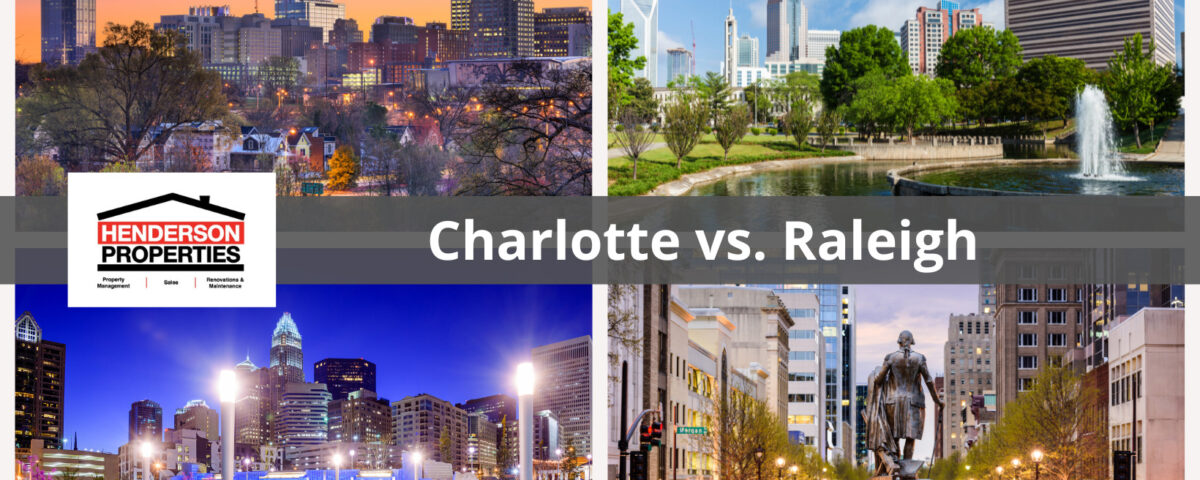- Walk-in Traffic is by Appointment Only - More Details
Charlotte vs. Raleigh: Real Estate Comparison

What to Ask Before Hiring a Property Management Company
October 2, 2024
North Carolina’s Appeal for California Investors
November 1, 2024Comparing the Carolina’s Top Real Estate Markets
When it comes to real estate in North Carolina, both Raleigh and Charlotte are top contenders, but it’s hard to deny that Charlotte stands out as the better place to live in 2024. Raleigh’s housing market is solid, with a median home price of $427,000, up 5.2% from last year, and it’s supported by the city’s tech and healthcare sectors. Neighborhoods like North Raleigh and Five Points are booming, and with good reason—they offer great schools and family-friendly environments. However, Charlotte is where the real magic happens.
As of 2024, Charlotte’s median home price sits at $410,000, driven by high demand in prime areas like Myers Park and South End. With Charlotte’s booming financial services sector—home to big names like Bank of America and Truist—it’s no surprise that the city is drawing in professionals from all over. The steady influx of high-income workers and a more affordable housing market compared to other major cities make Charlotte the top spot for homebuyers and investors.
Home Prices and Affordability
Both Raleigh and Charlotte have experienced impressive home price growth over the past decade due to limited housing inventory and strong demand. Here’s what’s happening:
- Raleigh:
- Median home price: $427,000, driven by the city’s tech and research sectors.
- Hot neighborhoods: North Hills, North Raleigh, and Five Points.
- Price drops in South Raleigh create opportunities for more affordable homes.
- Charlotte:
- Median home price: $410,000, with high-demand areas like Myers Park ($1.2M) and South End ($550K).
- Charlotte offers more diversity in neighborhoods and a broader range of prices.

Affordability for First-Time Buyers
Rising home prices in both cities challenge first-time buyers, but Charlotte’s suburbs, like Ballantyne and Matthews, offer more budget-friendly options without sacrificing access to urban amenities.
In Raleigh, areas like Holly Springs provide a similar suburban feel, but Charlotte’s proximity to business hubs makes it a stronger choice for buyers who want the best of both worlds.
Average Rent Prices
The rental markets in both Raleigh and Charlotte have become increasingly competitive, driven by population growth and the rising cost of homeownership. In Raleigh, the average rent for an apartment is now approximately $2,108, reflecting ongoing demand for rental properties. Charlotte’s rental market is similarly competitive, with average rent prices varying significantly by neighborhood. In Uptown Charlotte, the average rent for a one-bedroom apartment is about $2,100; in South End, two-bedroom apartments average around $2,500 per month.
Both cities are experiencing rental price increases due to limited inventory and strong demand. In Raleigh, the tech boom and growing job market have attracted young professionals and families, many of whom are opting to rent before buying. In Charlotte, high demand from financial services workers and corporate relocations has contributed to rising rents, particularly in trendy urban areas like South End and NoDa.
Vacancy Rates and Rental Demand
Raleigh and Charlotte both have low vacancy rates, signaling tight rental markets where available units are quickly occupied, often with multiple applicants. Raleigh’s vacancy rate has dropped to 4.2% from 4.6% the previous year, while Charlotte’s vacancy rates are similarly low. Several factors contribute to this competitive rental environment:
- Limited Supply: The slow pace of new construction due to rising material costs and labor shortages has exacerbated the shortage of rental properties in both cities.
- Delayed Developments: New apartment projects, particularly in affordable and mid-range segments, have been delayed, further constraining supply.
- Rising Rent Prices: With demand outpacing supply, rent prices are expected to continue rising, especially in high-demand areas near employment hubs and public transportation.

Local Job Market
While Raleigh’s tech-heavy economy, supported by Research Triangle Park, fuels growth, Charlotte’s financial services sector, anchored by major employers like Bank of America, Wells Fargo, and Truist, drives even stronger demand for housing.
Charlotte has also become a magnet for corporate relocations. With its lower cost of living and business-friendly environment, the city continues to attract professionals from pricier markets. This steady influx is a significant advantage for Charlotte’s real estate market.
Investment Opportunities
Both cities offer excellent opportunities for real estate investors, particularly in rental properties, but here’s why Charlotte edges ahead:
- Raleigh:
- Strong demand in North Raleigh and North Hills due to tech jobs.
- High occupancy rates and rising rental prices.
- Charlotte:
- Urban neighborhoods like South End and NoDa offer strong investment potential.
- Significant price appreciation driven by corporate relocations.
- High rental yields and occupancy rates make Charlotte an investor’s dream.
Suburban Explosion
Suburban expansion is another area where both cities offer promising investment opportunities. In Raleigh, suburbs like Holly Springs, Garner, and Wake Forest are seeing increased demand from families and professionals seeking more affordable housing options. These areas are also benefiting from new infrastructure projects, such as Raleigh’s planned commuter rail system, which will improve access to the city center.
In Charlotte, suburbs like Matthews, Concord, and Ballantyne offer similar opportunities for investors. These areas are experiencing rapid population growth as more families move out of the city in search of larger homes and better schools. Suburban areas near major highways and public transportation hubs are particularly attractive for investors, as they offer easy access to Charlotte’s job centers while providing a quieter, more affordable lifestyle.

Housing Supply and Inventory Levels
Both cities face inventory shortages, which continue to push home prices higher. Raleigh’s inventory has increased slightly, but demand still outpaces supply, especially in the $300,000 to $500,000 price range. Charlotte, however, continues to see a more dynamic market, with high-demand neighborhoods like MoRa and Foxcroft remaining competitive.
Charlotte’s broader range of housing options also makes it easier to find the perfect home, even in a tight market.
Popular Areas & Neighborhoods
- Raleigh:
- North Raleigh
- North Hills
- Five Points
- Brier Creek
- Downtown Raleigh
- Charlotte:
- South End
- NoDa
- Myers Park
- Dilworth
- Plaza Midwood
Future Outlook for 2025
Looking ahead to 2025, both Raleigh and Charlotte will see moderate home price growth driven by population increases and job creation, but Charlotte holds a clear edge for long-term potential. As a major financial hub and destination for corporate relocations, Charlotte’s diversified economy is attracting a steady influx of skilled workers and businesses across industries like healthcare, tech, and manufacturing.
This economic strength, paired with significant infrastructure investments like the light rail expansion, enhances property values and keeps demand high across various neighborhoods, particularly in areas like South End and NoDa. While benefiting from its tech-driven growth around Research Triangle Park, Raleigh faces more constraints due to its smaller scale and reliance on specific sectors.
Although Raleigh continues to attract tech companies and professionals, Charlotte’s economic diversity, corporate migration, and advanced infrastructure give it a more balanced and sustainable real estate market for the future.

Where’s Better to Live?
Raleigh may have its tech scene and suburban charm, but let’s be real—Charlotte is where it’s at.
Whether you’re drawn to the booming financial sector, the influx of corporate relocations, or the diverse neighborhoods that cater to every lifestyle, Charlotte has something for everyone.
From the trendy vibes of South End to the family-friendly atmosphere of Ballantyne, Charlotte offers a quality of life that’s hard to beat. If you’re looking for a city with growth potential, a thriving job market, and vibrant communities, Charlotte is the place to be.
Interested in buying a home in the area? Reach out to our team and let us help!




